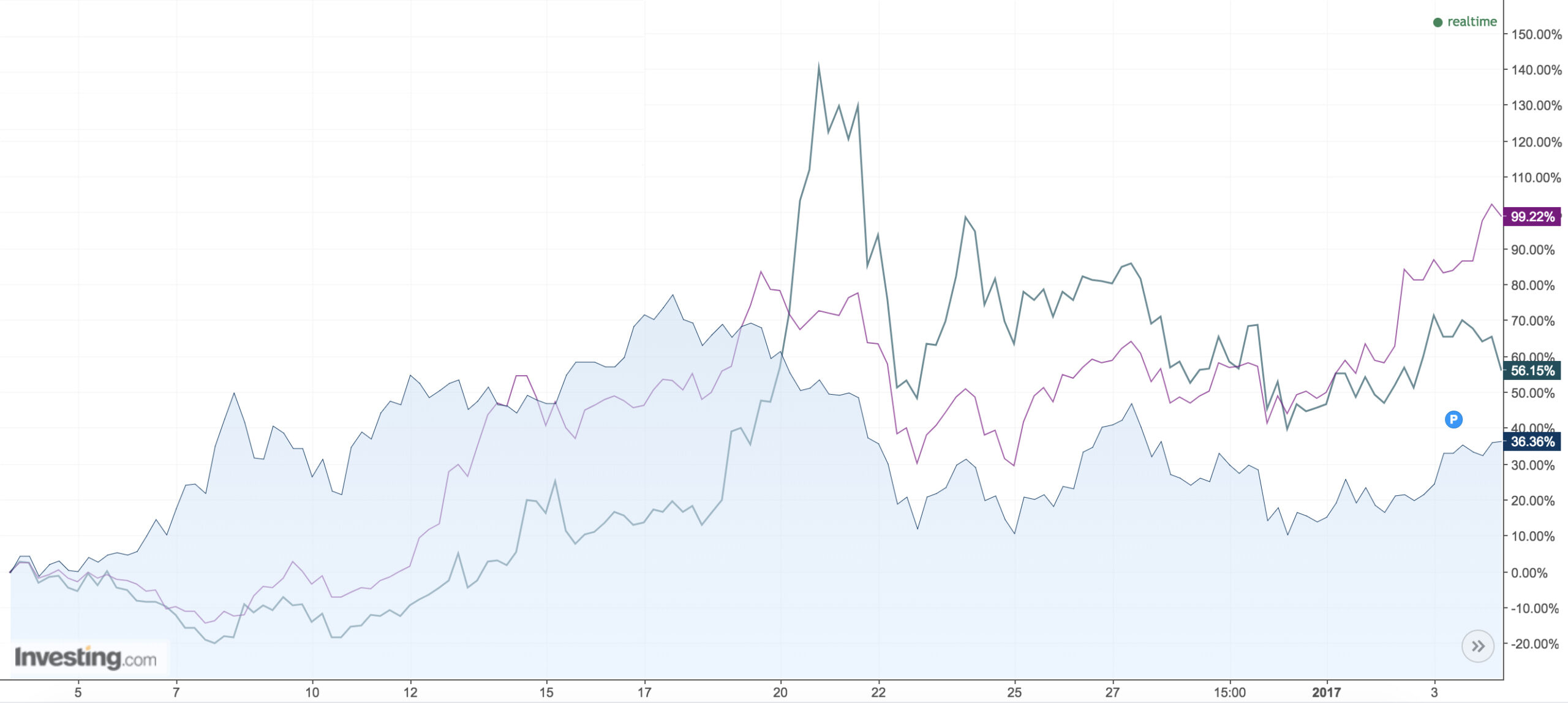Where the Aussie crazy crypto road trip will take us in 2018

One Bitcoin could get you a lot of virtual daiquiris...but keep your real money to buy real things for now. Pic: Getty
Bitcoin began its seemingly inexorable rise only six months ago, and cryptocurrencies, Initial Coin Offers, and blockchain businesses will remain a feature of the corporate landscape in 2018.
DigitalX (ASX:DCC) CEO Leigh Travers says 2018 will see the continued rise of Ethereum, currently no. 2 to Bitcoin’s top dog, and there will be a bigger focus on what blockchain can do for business.
He sees supply chain companies leading that. Currently, the main blockchain-for-logistics play on the ASX is Yojee (ASX:YOJ) which is slowly building a customer base in South East Asia and Australia.
Reffind (ASX:RFN) bought a stake in global blockchain rewards play Loyyal in December to get into the ‘blockchain for business process improvement’ game.
Bitcoin, the world’s most famous cryptocurrency, dropped sharply over Christmas but appears not to be finished as a speculative play.
In December, the value of transactions on the Bitcoin network went from $US1 billion to $20 billion.
Settlement times to buy and sell the digital currency began stretching from hours to days, as the network struggled to process more than four transactions a second.
Bitcoin hit a peak of $US19,694 on December 17, and crashed to $12,629 by the end of the month.
Users began switching into Ethereum, Ripple and Bitcoin Cash, sending the value of the alternate cryptocurrencies surging.

Crypto has legs
Many agree that while the crypto-craze is here to stay, the current corporate buzz is a bubble.
“If you want to play the whole blockchain thing just go and buy some Bitcoin and decide if you want to pay $22,000,” Cyan Asset Management’s Dean Fergie told Stockhead.
“What you will find, and I can generalise for companies like Fatfish Internet Group and iCandy and Mobecom, is that lots of these businesses will know that this is a bit hyped up and try to make some tenuous kind of attachment to this whole blockchain, Bitcoin market.
“What this will mean for actual revenue or profitability in the near term is insignificant to zero.”
But only three had businesses that, by the end of the year, were revenue-generating blockchain or cryptocurrency operations: DigitalX, Mobecom (ASX:MBM) and Yojee.
All the others were either rumours, promises, or to-be-completed investments or projects.
At the time of writing iCandy had extended a six week trading halt as it tried to make an acquisition.
By the end of December, Serpentine Technologies (ASX:S3R) had joined the list of companies being promoted as a crypto stock on rumour only. This list includes Transaction Solutions International (ASX:TSN), and the shell companies Alchemia (ASX:ACL) and Zyber (ASX:ZYB).
| Ticker | Name | 2017 price change | Price (Jan 4) | 2018 price change | Mkt Cap |
|---|---|---|---|---|---|
| BPG | Byte Power Group | 799% | 0.009 | 0% | 20115630 |
| DCC | DigitalX | 7.06 | 0.345 | 1% | 169753312 |
| YOJ | Yojee | 5.46 | 0.32 | 6% | 181376592 |
| SHO | Sportshero | 3.45 | 0.14 | 40% | 21723514 |
| FFG | Fatfish Internet Group | 1.75 | 0.079 | 4% | 34358176 |
| OOK | Ookami | 1.72 | 0.14 | -3% | 19954792 |
| ZYB | Zyber Holdings | 1.33 | 0.025 | 53% | 9073101 |
| FGF | First Growth Funds | 1.28 | 0.037 | 118% | 13836458 |
| NOV | Novatti Group | 1.11 | 0.385 | 4% | 51489140 |
| ACL | Alchemia | 0.71 | 0.049 | 0% | 3896683.5 |
| MBM | Mobecom | 0.58 | 0.42 | 7% | 66406648 |
| CCA | Change Financial | 0.35 | 0.81 | -2% | 64684924 |
| ICI | iCandy Interactive | 0.14 | 0.16 | 14% | 44350840 |
| RFN | Reffind | -0.18 | 0.047 | -4% | 15465000 |
| KYK | Kycker | -0.35 | 0.24 | 17% | 18599938 |
| S3R | Serpentine Technologies | -0.38 | 0.015 | 14% | 5236169.5 |
| CHP | Chapmans | -0.5 | 0.018 | 50% | 13000000 |
| TSN | Transactions Solutions International | -0.6 | 0.011 | 0% | 23386144 |
Crypto isn’t coming, it’s here
Virtual currencies and tradeable tokens are being legitimised.
This is thanks to institutional support like the Bitcoin futures markets in the US, and policy changes such as Australia’s move to regulate cryptocurrency exchanges under “Know Your Customer” (KYC) and anti-money laundering legislation.
HopgoodGhanim Lawyers partner Josh Hunt says this year more institutions, like ETFs and property funds, will use their networks to issue tokens backed by real world assets.
“If you’re backed by real world assets, your token should theoretically be a lot more stable and therefore be easier to trust as a medium of exchange,” he told Stockhead.
Indeed, on Wednesday BitFund said it would launch a crypto futures company on the ASX to allow investors to more easily access the field.
Indeed, even the RBA has thought about it.
Governor Philip Lowe outlined in December the theoretical basis for an eAUD, but concluded it’s not feasible yet.
“But in reality these currencies are not being commonly used for everyday payments and, as things currently stand, it is hard to see that changing,” he said in a speech.
“The current fascination with these currencies feels more like a speculative mania than it has to do with their use as an efficient and convenient form of electronic payment.”
ICOs are the next big thing
ICOs, an IPO-like method of fundraising where issuers offer tradable tokens rather than shares, have people divided.
Some lawyers and analysts spoken to by Stockhead say the unregulated sector is riding for a fall and will be unwound by regulators.
The ASX is yet to be convinced, saying businesses listing, or backdoor listing, on the exchange or looking to get into ICOs will have to convince the bourse that they’re fully compliant with the minimal laws available.
Others are hoping regulators do step in, but with light-touch rules.
DigitalX’s Mr Travers says the ICO landscape is looking “at least as strong as the close of 2017”, when ICO Bench listed 18 ICOs in Australia and over half a dozen others were being marketed to Australians.
He’s forecasting more regulated ICOs in 2018 – those which will fall under Corporations Act rules – and more companies that actually have a product rather than raising money for an idea.
ASIC said in October it would regulate ICOs under the Corporations Act if they behaved as managed investment funds, offered tokens that were effectively shares or derivatives, or provided financial services such as crowd-sourced funding.
HopgoodGhanim Lawyers partner Josh Hunt, who is a fan of ICOs, says light-touch rules would suffice around issues like basic transparency, background checks on the board, and know your customer/anti-money laundering rules.
“There’s no doubt it’s still the Wild West, but we would see that it’s not overly different from early stage, risky exploration plays in countries that are pretty light on regulation. You only need to look at the DRC, or Egypt, or anywhere in Africa where the political risk is high [for examples of risky stocks],” he told Stockhead.
Mr Hunt says Aussie ICOs are not clearly explaining why they aren’t a security in their prospectus-like white papers, because they don’t want to be the first ones to draw the line.
UNLOCK INSIGHTS
Discover the untold stories of emerging ASX stocks.
Daily news and expert analysis, it's free to subscribe.
By proceeding, you confirm you understand that we handle personal information in accordance with our Privacy Policy.








